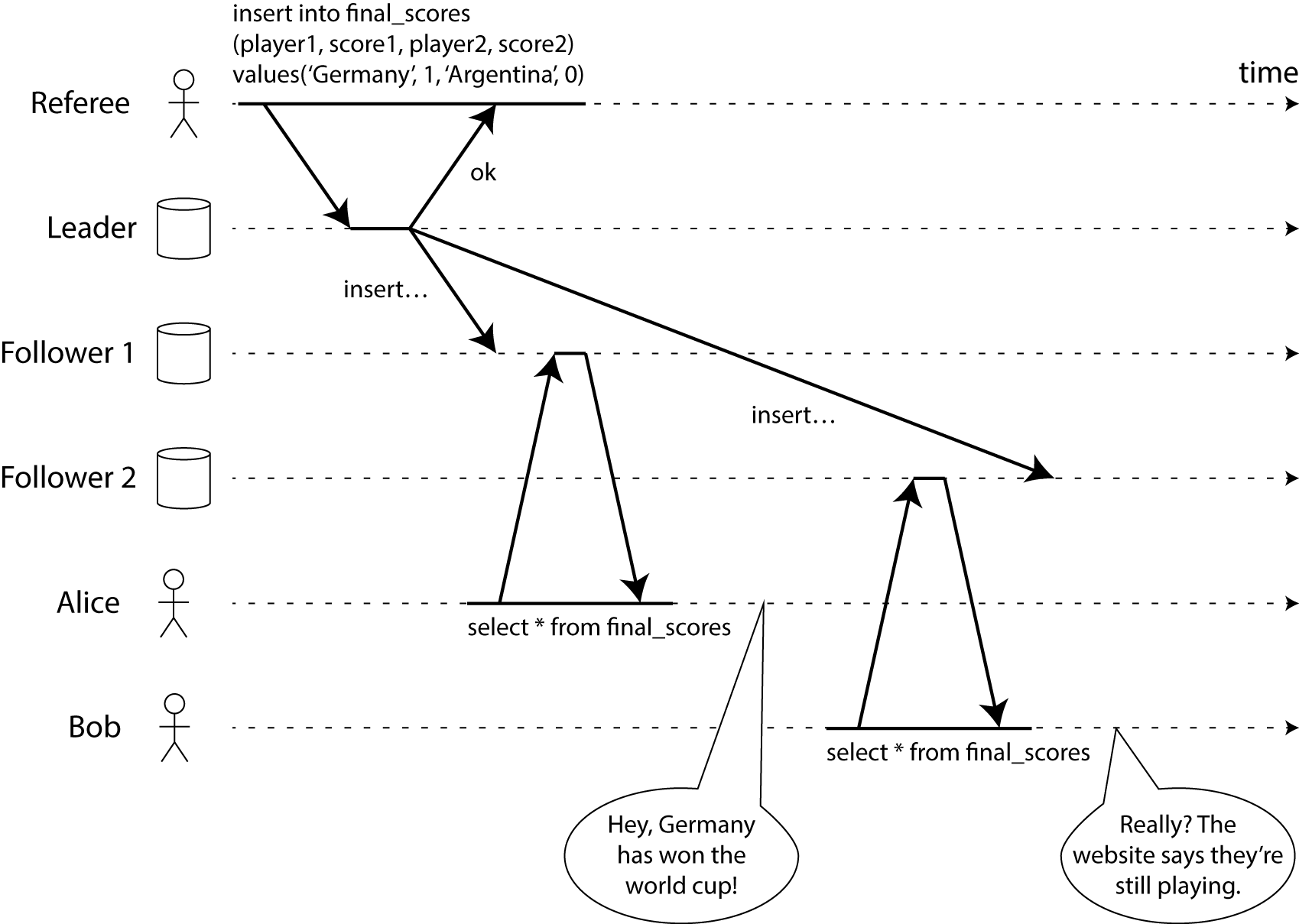Status
Current state: Draft
Discussion thread: TBD
JIRA: TBD
Please keep the discussion on the mailing list rather than commenting on the wiki (wiki discussions get unwieldy fast).
Motivation
KIP-595 ships a Kafkaesque Raft algorithm to serve as the foundation of metadata quorum. We migrated and customized the Raft protocol to fit in metadata replication need, but the exploration does not end with just the basic replication and leader election. There are more standard features described in the Raft literature, which are very useful in general production system as well as in Kafka context. In this follow-up KIP, we would like to ship two major features, the pre-vote and non-leader linearizable read.
Proposed Changes
Pre-vote
In the context of Raft, it is a very common for leaders to hit network partition. We implemented the progress timeout in KIP-595, so that when a majority of voters are not fetching from the leader, the current leader will start election to reach out to other followers to re-establish the leadership or learn about the new leader. However, if the zombie leader could not connect to the quorum for long enough, it will timeout and start election, while bumping its epoch. Until it eventually reconnects to the quorum, the zombie leader will repeatedly bump its epoch due to election time out. The consequence is that the zombie leader will gain a much higher epoch than other voters inside the quorum and win the election, introducing extra unavailability. During quorum reassignment, the removed voters could also try to start election to ask active leader to step down which affects the ongoing transition. This is called "disruptive server" the Raft literature. Furthermore, the rapid bumping of the epoch increases the chance of epoch overflow, which is very dangerous in the Kafka Raft as we have been using uint32 for epoch due to historical message formats, compared with using uint64.
Fortunately, the Raft literature documents the preventions to avoid such a corner case. The idea is called `pre-vote`, which is that the candidate will try to send out a request to all the known voters and ask whether they would vote for it. If rejected, the candidate will keep retrying to send out pre-vote requests without bumping the epoch, or disturbing the quorum. Overall this reduces the availability drop caused by a zombie node election.
Non-leader Linearizable Read
Metadata log is only written by the leader controller, but there would be three regular readers other than the leader controller:
- Quorum follower
- Quorum observer
- Client: consumer, producer, admin, etc
As we know the leader controller always sees the latest change, where there is always a certain lag between its own log and the followers. If we redirect all the log read request to the leader, it will get overloaded for sure; if we allow reading from secondary copy, like observer reading from follower, or client reading from observer, there is no way to guarantee linearizable result. Consider a case where there is one event for a football game final score, the message gets written to the leader, and successfully replicated to the follower majority, which is then visible to the client. But the second read request being sent to a slow follower may not receive this message yet, so the result will show that the game hasn't stopped yet, which is inconsistent and a violation of linearizability.
Public Interfaces
We plan to a flag to the Vote RPC to indicate whether this request is a pre-vote:
{
"apiKey": 50,
"type": "request",
"name": "VoteRequest",
"validVersions": "0",
"flexibleVersions": "0+",
"fields": [
{ "name": "ClusterId", "type": "string", "versions": "0+",
"nullableVersions": "0+", "default": "null"},
{ "name": "Topics", "type": "[]TopicData",
"versions": "0+", "fields": [
{ "name": "TopicName", "type": "string", "versions": "0+", "entityType": "topicName",
"about": "The topic name." },
{ "name": "Partitions", "type": "[]PartitionData",
"versions": "0+", "fields": [
{ "name": "PartitionIndex", "type": "int32", "versions": "0+",
"about": "The partition index." },
{ "name": "CandidateEpoch", "type": "int32", "versions": "0+",
"about": "The bumped epoch of the candidate sending the request"},
{ "name": "CandidateId", "type": "int32", "versions": "0+",
"about": "The ID of the voter sending the request"},
{ "name": "LastOffsetEpoch", "type": "int32", "versions": "0+",
"about": "The epoch of the last record written to the metadata log"},
{ "name": "LastOffset", "type": "int64", "versions": "0+",
"about": "The offset of the last record written to the metadata log"},
{ "name": "PreVote", "type": "boolean", "versions": "0+", // NEW
"about": "Suggest whether given request is a pre-vote"},
]
}
]
}
]
}
A separate RPC called ReadIndex shall be implemented for the non-leader node to query the current safe index for a linearizable query.
{
"apiKey": N,
"type": "request",
"name": "ReadIndexRequest",
"validVersions": "0",
"flexibleVersions": "0+",
"fields": [
{ "name": "ClusterId", "type": "string", "versions": "0+",
"nullableVersions": "0+", "default": "null"},
{ "name": "Topics", "type": "[]TopicData",
"versions": "0+", "fields": [
{ "name": "TopicName", "type": "string", "versions": "0+", "entityType": "topicName",
"about": "The topic name." },
{ "name": "Partitions", "type": "[]PartitionData",
"versions": "0+", "fields": [
{ "name": "PartitionIndex", "type": "int32", "versions": "0+",
"about": "The partition index." },
]
}
]
}
]
}
Compatibility, Deprecation, and Migration Plan
- What impact (if any) will there be on existing users?
- If we are changing behavior how will we phase out the older behavior?
- If we need special migration tools, describe them here.
- When will we remove the existing behavior?
Rejected Alternatives
If there are alternative ways of accomplishing the same thing, what were they? The purpose of this section is to motivate why the design is the way it is and not some other way.
Citation
Please stop calling databases CP or AP, Published by Martin Kleppmann on 11 May 2015
